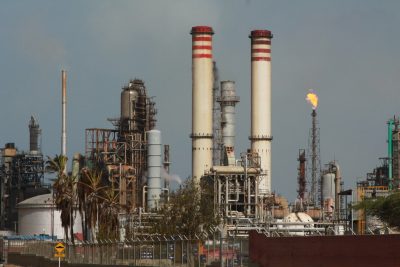US Treasury Department Tightens Sanctions on Venezuela Oil Sector
Washington is targeting diluent imports, hurting Venezuela’s ability to export oil and produce fuel.

The US Treasury Department has announced a hardening of measures against Venezuela’s oil industry.
In an amendment to the Venezuela sanctions published on Thursday, Washington stated that the existing licenses, which allow certain companies to continue dealing with Venezuela state oil company PDVSA for a given period, “do not authorize transactions or dealings related to the exportation or reexportation of diluents, directly or indirectly, to Venezuela.”
Venezuela relies on imports of diluents to blend its heavy crude into exportable grades, as well as produce gasoline and diesel for internal consumption.
Venezuela’s declining oil production was significantly worsened by the impact of US economic sanctions, with crude output dropping by 30 percent, from an average of 1.911 million barrels per day (bpd) in 2017 to 1.354 million in 2018, following the August 2017 financial sanctions imposed by the Treasury Department.
Output further fell in 2019 as a result of the late January US embargo as well as nationwide blackouts in March, falling to just 740 thousand bpd in March before rebounding slightly in April. Output in May has reportedly fallen 17 percent from April. Oil exports to the US fell from over 500 thousand bpd in January to zero in late May, as the three month winding down period from January’s measures came to an end.
Restrictions on diluent imports have led to recent gasoline shortages, with long queues witnessed at gas pumps, particularly in the west of the country. Imports of fuel and diluents reportedly fell to 137,500 bpd in May, from over 200,000 bpd in March and April. National demand is estimated at around 250,000 bpd.
Fuel shortages were also a factor during the March electricity crisis, as backup thermoelectric plants could not be brought online due to lack of diesel. An estimated one-fifth of the country’s thermoelectric capacity is currently operational.
Caracas scrambled to find new buyers in the wake of the US oil embargo, seeking to divert exports to India as well as swap crude for diluents or fuel in a bid to to circumvent US sanctions. However, US officials pressured companies into winding down their transactions with Venezuela, with reiterated threats of secondary sanctions.
A recent report from the Washington DC think-tank Center for Economic and Policy Research analyzed the impact of sanctions on Venezuela’s oil sector, with an estimated US $6 billion lost in the 12 months following the August 2017 financial sanctions. Authors Mark Weisbrot and Jeffrey Sachs estimate another $6.8 billion in lost export revenue this year should production remain at current levels. The report further argues that US sanctions have been responsible for 40,000 deaths since 2017.
*
Note to readers: please click the share buttons above or below. Forward this article to your email lists. Crosspost on your blog site, internet forums. etc.
Featured image: Amuay refining complex in Falcon State. (Wikimedia Commons)

